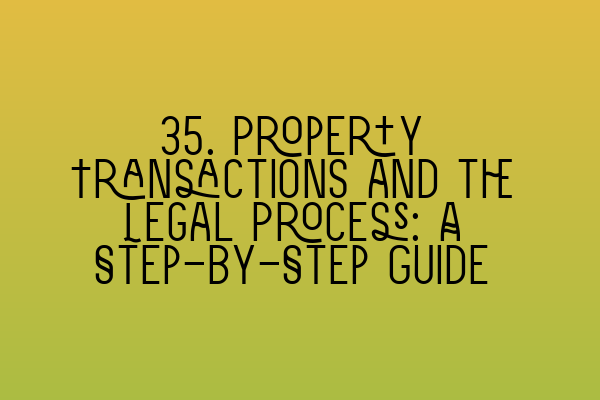35. Property Transactions and the Legal Process: A Step-by-Step Guide
Property transactions can be complex and involve a number of legal steps. Whether you are buying or selling a property, it’s important to understand the legal process involved to ensure a smooth and successful transaction. In this step-by-step guide, we will walk you through the essential stages of a property transaction and provide you with the necessary information to navigate the legal process with ease.
Step 1: Preparing for the Transaction
The first step in any property transaction is to gather all the necessary information and documentation. As a buyer, you will need to conduct a thorough property search and obtain a copy of the title deeds. As a seller, you will need to gather relevant documents such as the Energy Performance Certificate (EPC) and any planning permissions or building regulations certificates. It’s also advisable to instruct a solicitor or conveyancer at this stage to guide you through the legal process.
For a comprehensive overview of the SQE 1 examination, check out our article on SQE 1 Practice Exam Questions. It will provide you with valuable insights and practice questions to help you prepare for the exam.
Step 2: Negotiating the Sale/Purchase
Once you have gathered all the necessary information, it’s time to negotiate the terms of the sale or purchase. This includes the price, fixtures and fittings, and any conditions or stipulations. It’s important to engage in clear and open communication with the other party to reach a mutually beneficial agreement.
If you’re looking for practice mocks to improve your preparation for the SQE 1 exam, take a look at our article on SQE 1 Practice Mocks FLK1 FLK2. It offers a range of mock quizzes designed to test your knowledge and enhance your performance.
Step 3: Instruction of Solicitors
Once the terms of the sale or purchase have been agreed upon, it’s time to instruct solicitors or conveyancers to handle the legal aspects of the transaction. Your solicitor will draft the necessary legal documents, including the contract of sale/purchase and any necessary transfers or lease agreements. They will also conduct searches on your behalf to ensure there are no hidden legal issues or concerns with the property.
Step 4: Mortgage and Financing
If you require financing for your property purchase, you will need to apply for a mortgage. Your solicitor can assist you in understanding the mortgage terms and conditions and guide you through the process of securing a mortgage offer. They will also ensure that the mortgage deed is properly executed and registered.
For valuable resources and preparation courses for the SQE 2 examination, visit our article on SQE 2 Preparation Courses. It will equip you with the necessary knowledge and materials to excel in your exam.
Step 5: Exchange of Contracts
The exchange of contracts is a crucial stage in the property transaction process. At this point, both parties are legally bound to complete the transaction. You will need to pay a deposit (usually 10% of the purchase price) and agree on a completion date. It’s important to carefully review the contract and seek legal advice before exchanging contracts to avoid any potential issues.
Step 6: Completion
Completion is the final stage of the property transaction process. On the agreed-upon completion date, your solicitor will arrange for the transfer of funds from the buyer’s solicitor to the seller’s solicitor. Once the funds have been received, the keys to the property will be released, and the legal ownership will be transferred to the buyer. Your solicitor will also register the change of ownership with the Land Registry.
If you’re preparing for the SQE 1 exam and need assistance with your studies, take a look at our article on SQE 1 Preparation Courses. It offers comprehensive courses and study materials to help you succeed in your examination.
Step 7: Post-Completion Matters
After completion, there are a few post-completion matters that need to be addressed. This includes notifying utility providers of the change in ownership, updating your address with relevant authorities, and arranging for any necessary repairs or renovations. Your solicitor can assist you with these tasks and ensure a smooth transition into your new property.
For up-to-date information on SRA SQE exam dates and registration deadlines, refer to our article on SRA SQE Exam Dates. It provides a comprehensive overview of the examination schedule, allowing you to plan your preparation effectively.
Conclusion
Property transactions involve several legal steps, and it’s vital to have a clear understanding of the process to ensure a successful outcome. By following this step-by-step guide, you will be well-equipped to navigate through the various stages of a property transaction with confidence. Remember to seek professional legal advice and assistance throughout the process to safeguard your interests and ensure compliance with relevant laws and regulations.
